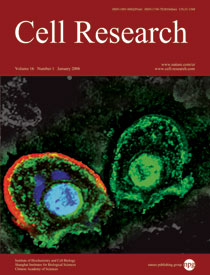
Volume 16, No 1, Jan 2006
ISSN: 1001-0602
EISSN: 1748-7838 2018
impact factor 17.848*
(Clarivate Analytics, 2019)
Volume 16 Issue 1, January 2006: 3-10
REVIEWS
GATA-3 promotes Th2 responses through three different mechanisms: induction of Th2 cytokine production, selective growth of Th2 cells and inhibition of Th1 cell-specific factors
Jinfang Zhu1, Hidehiro Yamane1, Javier Cote-Sierra1, Liying Guo1, William E Paul1
1Laboratory of Immunology, National Institute of Allergy and Infectious Diseases, National Institutes of Health, Bethesda, MD 20892, USA
Correspondence: Jinfang Zhu(jfzhu@niaid.nih.gov)
Naïve CD4 T cells can differentiate into at least two different types of T helpers, Th1 and Th2 cells. Th2 cells, capable of producing IL-4, IL-5 and IL-13, are involved in humoral immunity against extracellular pathogens and in the induction of asthma and other allergic diseases. In this review, we summarize recent reports regarding the transcription factors involved in Th2 differentiation and cell expansion, including Stat5, Gfi-1 and GATA-3. Stat5 activation is necessary and sufficient for IL-2-mediated function in Th2 differentiation. Enhanced Stat5 signaling induces Th2 differentiation independent of IL-4 signaling; although it does not up-regulate GATA-3 expression, it does require the presence of GATA-3 for its action. Gfi-1, induced by IL-4, promotes the expansion of GATA-3-expressing cells. Analysis of conditional Gata3 knockout mice confirmed the critical role of GATA-3 in Th2 cell differentiation (both IL-4 dependent and IL-4 independent) and in Th2 cell proliferation and also showed the importance of basal GATA-3 expression in inhibiting Th1 differentiation.
Cell Research (2006) 16:3-10. doi:10.1038/sj.cr.7310002; published online 16 January 2006
FULL TEXT | PDF
Browse 2151


